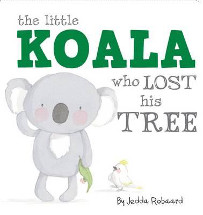Little Creatures series by Jedda Robaard

Five Mile Press, 2015.
The little koala who lost his tree. ISBN 9781760069223
The little joey who lost her bounce. ISBN 9781760063467
(Ages: 2-5) Recommended. Board Books. Here are two new titles in the
Little Creatures series by Jedda Robaard, all of which are
about an animal who has lost something and is trying to get it back.
Others in the series include The little mouse who lost her
squeak and The little bear who lost her way. These new
titles are the first to feature native Australian animals. The
underlying concept is similar to the popular Usborne Touchy Feely That's
not my . . . series, however without the textural element.
The slightly longer and more complex narrative text and the addition
of interactive flaps make this Little Creatures series
suitable for a slightly older audience than the Usborne books.
In Little Koala who lost his tree, koala wakes up not in his
own bed, but in an apple tree. Desperately tired, he tries out
different beds, including a washing basket, a television antenna and
a tent. However, there is always something not quite right . . . too
noisy, not enough room, too wobbly, too wet. He climbs the nearest
tree and bingo! He has found his bed, right where he left it!
The little joey who lost her bounce Little Joey has not lost
something physical like little koala. She wakes up knowing she needs
to bounce, but she cannot remember how. She looks in the cupboard
with the bouncy balls, she tries jumping on the trampoline and tying
springs to her feet. She even tries the big bouncy bed, but nothing
brings back her bounce. Then, just as Little Joey sits down to
ponder her next move she falls backwards onto her tail . . . and her
bounce is back!
The flaps - some which open up to make double the page height - make
for an interactive reading experience for young children and the
board book format and durable flaps make them suitable for
independent exploration. The narrative, while kept short and simple,
integrates some more interesting vocabulary, such as
'uncomfortable', 'restless' and 'familiar', so is suited to its
target audience of toddlers and pre-schoolers.
The soft, watercolour illustrations by Robaard portray the cute,
cartoon style main characters. The fun typeface is large and
integrated with the illustrations, making it perfect for
pre-schoolers and their developing awareness of print.
Nicole Nelson